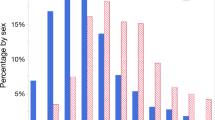Abstract
Objective
To describe the relationship between parents with gender identity disorder (GID) and their child(ren) as described by the parent and to understand how being a parent affects transitioning from one gender to the other.
Methods
Fourteen parents with GID underwent a semi-structured interview and completed the Index of Parental Attitudes (IPA). An IPA score of greater than 30 indicates parent–child relationship difficulties (range 0–100). The authors also conducted the SCID-I to establish other Axis I disorders.
Results
We assessed 12 male to female and two female to male parents with GID residing in Ireland. In total, 14 GID parents had 28 children. Three children had no relationship with their GID parent. The other 25 children, as reported by the parent, had good relationships with their children. In addition, these 25 children average score IPA score was 6.4 (range 0–25). Twelve GID parents (86 %) believed that being a parent had no effect on their desired level of transitioning, while two were influenced not to transition. Eleven GID parents (79 %) reported that being a parent had increased the time taken to commence transitioning, two have stopped transitioning altogether, while one cited no effect on time.
Conclusion
Parents with GID report positive relationships or no relationship with their children and the IPA revealed no clinical problems. Being a parent can prolong transitioning time in people with GID and can affect overall achieved level of transitioning.

Similar content being viewed by others
References
Von Kesteren P, Gooren L, Megans J (1996) An epidemiological and demographic study of transsexuals in the Netherlands. Arch Sex Behav 25:589–600
Di Ceglie D, Freedman D (1998) A sranger in my own body: atypical gender identity development and mental health. Karnac Books, London, UK
Tully B (1992) Accounting for transsexualism and transhomosexuality. Whiting and Birch, London
De Gascun KJ, Salter N, Lucey JV, O’Shea D (2006) Gender identity disorder. Ir Med J 3:146–148
White T, Ettner R (2007) Adaptation and adjustment in children of transsexual parents. Eur Child Adolesc Psychiatry 16:215–221
Green R (1978) Sexual identity of 37 children raised by homosexual or transsexual parents. Am J Psychiatry 135:692–697
Di Ceglie D, Freedman D, Tasker F (2002) Children and adolescents with transsexual parents referred to a specialist gender identity development service: a brief report of key developmental features. Clin Child Psychol Psychiatry 7:423–432
American Psychiatric Association (1994) Diagnostic and statistical manual of mental disorders, 4th edn. Washington, DC, USA
Hudson WW (1982) The clinical measurement package: a field manual. Dorsey Press, Chicago
First MB, Spitzer RL, Robert L, Gibbon M, Williams JBW (1996) Structured clinical interview for DSM-IV-TR Axis I Disorders, Clinical Version (SCID-CV). American Psychiatric Press Inc, Washington DC
Conflict of interest
None.
Author information
Authors and Affiliations
Corresponding author
Rights and permissions
About this article
Cite this article
Church, H.A., O’Shea, D. & Lucey, J.V. Parent–child relationships in gender identity disorder. Ir J Med Sci 183, 277–281 (2014). https://doi.org/10.1007/s11845-013-1003-1
Received:
Accepted:
Published:
Issue Date:
DOI: https://doi.org/10.1007/s11845-013-1003-1



